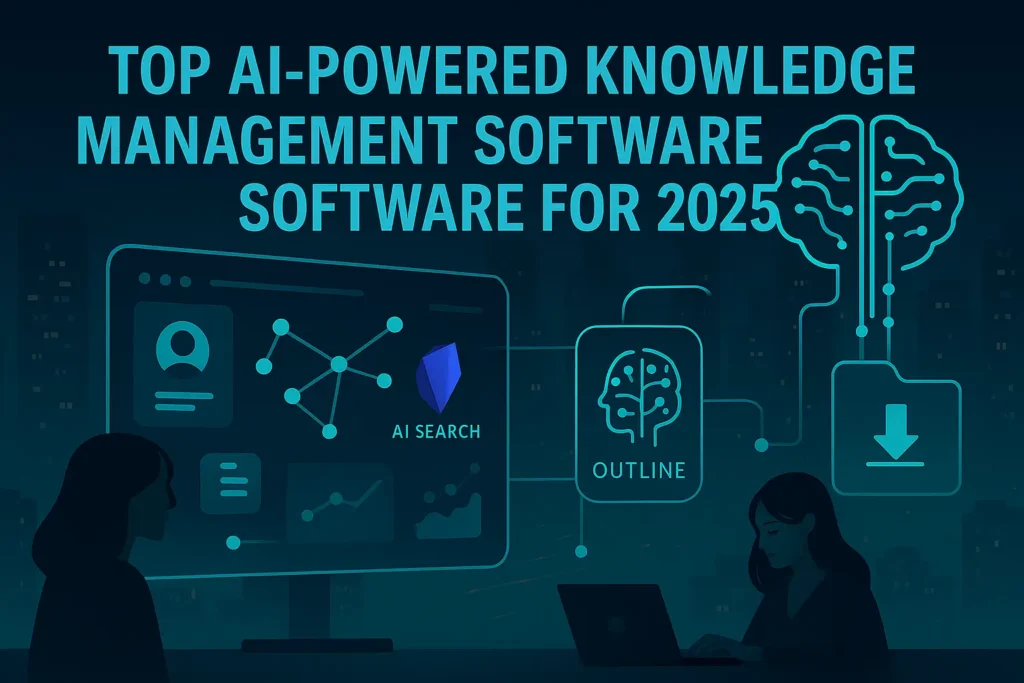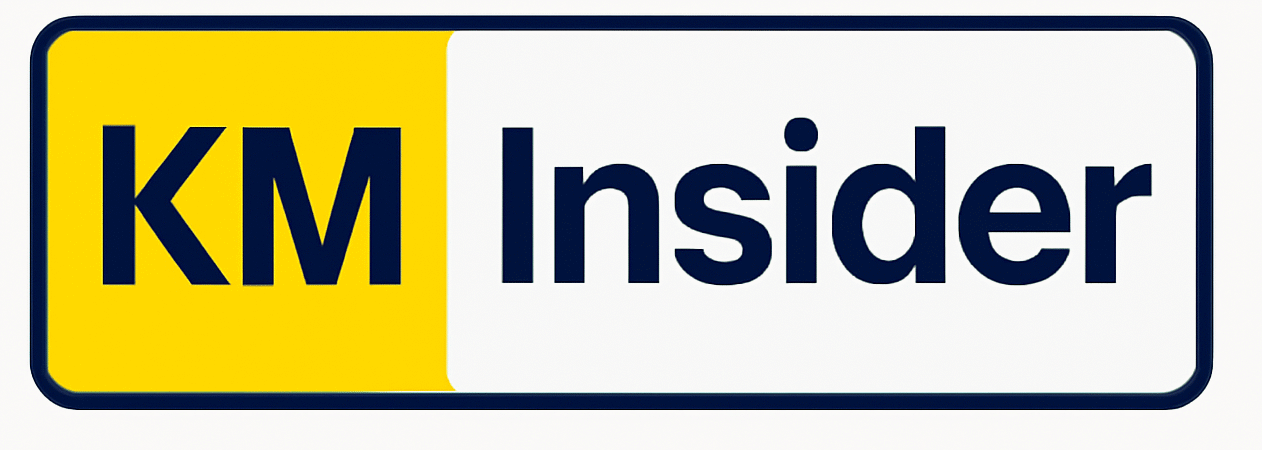Artificial Intelligence is transforming how organizations capture, share, and manage knowledge. In 2025, AI-powered knowledge management software is not just a luxury—it’s a strategic necessity. With global teams generating massive volumes of data daily, traditional knowledge systems can’t keep up. That’s where AI steps in.
From auto-tagging documents and generating summaries to surfacing relevant information in real time, AI enables smarter, faster, and more scalable knowledge workflows.
In this article, we explore the top AI-driven KM tools for 2025, what makes them different, and how they help teams improve productivity and decision-making.

AI-Powered Knowledge Management Software for 2025
Why AI in Knowledge Management?
AI brings automation, personalization, and intelligence to knowledge systems. Here’s how it transforms KM:
- Content Discovery: AI algorithms analyze user behavior, context, and history to suggest relevant documentation at the right time. This reduces search time and improves information access.
- Search Enhancement: Natural Language Processing (NLP) enables smarter, intent-based search. Instead of relying on exact keyword matches, NLP-powered systems understand what the user is trying to find.
- Content Automation: AI tools can auto-generate documentation from meeting transcripts, summarize lengthy reports, and even rewrite outdated SOPs with fresh language.
- Data Structuring: AI automatically tags new content, categorizes pages into logical clusters, and builds topic ontologies. This keeps knowledge bases clean and easy to navigate.
- Employee Enablement: Conversational AI agents or embedded assistants can instantly retrieve relevant articles or documents—empowering employees to self-serve without waiting for help.
By reducing manual effort and enabling contextual knowledge delivery, AI-driven KM platforms help organizations stay competitive and agile.
Features to Look for in AI KM Software
Not all AI is created equal. When evaluating AI-enabled KM platforms, prioritize these high-impact capabilities:
- Semantic Search: Go beyond keywords. AI systems with semantic search can infer user intent, understand synonyms, and deliver the most relevant answer from across your content repository.
- AI Recommendations: Look for tools that suggest articles, SOPs, or FAQs based on what employees are working on, recently viewed, or struggling to find.
- Automated Content Tagging: Content is automatically categorized and linked to relevant topics, saving hours of manual effort.
- Auto-Summarization: Long reports or documents are condensed into short summaries so readers can quickly scan and understand key points.
- Conversational AI: Chatbots or virtual assistants can answer common questions by pulling from your internal knowledge base. This is especially useful for onboarding, support, and HR queries.
- Content Health Insights: AI systems can flag outdated articles, duplicate pages, or knowledge gaps, helping KM admins maintain quality and accuracy.
Best AI-Powered KM Tools for 2025
1. Whale
Whale uses AI to standardize knowledge sharing and simplify training processes. Designed for SOP-driven teams, Whale makes it easy to onboard, train, and support employees remotely.
- AI-assisted SOP creation and playbook generation
- Identifies outdated content and suggests updates
- Analytics to track content usage and employee learning
👉 Try Whale for AI-driven SOPs and KM
2. Guru
Guru integrates deeply with your workflow tools and delivers real-time knowledge via browser extensions and messaging platforms. Its AI layer enables proactive knowledge delivery.
- Slack, Teams, and Chrome extension integration
- AI-driven verification reminders to keep content fresh
- Suggests relevant cards when users ask common questions
3. Bloomfire
Bloomfire uses AI to power search across text, audio, and video content. It’s well-suited for companies with diverse content formats.
- AI indexes and transcribes multimedia content
- Smart search ranks results based on relevance and popularity
- Insights dashboard for content usage and knowledge gaps
4. Kipwise
Kipwise is a smart knowledge sharing platform that focuses on team enablement and in-context documentation delivery.
- AI-generated content suggestions based on activity
- Slack and Teams integrations for instant knowledge sharing
- Collaboration tools to build articles faster as a team
5. Starmind
Starmind takes a people-first approach by using AI to map internal expertise and route questions to the best person—not just a document.
- Builds dynamic expertise maps across the company
- Connects employee questions to subject-matter experts in real-time
- AI learns over time to reduce question repetition and increase accuracy
6. Zoho Wiki / Zoho Qntrl + Zia AI
Zoho’s suite integrates with Zia, its AI assistant, across multiple tools. In knowledge management, it enables automation and intelligent content suggestions.
- Automated knowledge retrieval and contextual task linking
- AI insights into knowledge gaps
- Works well in multi-tool environments using Zoho ecosystem
7. ServiceNow Knowledge Management + AI Search
Enterprise-grade and IT-focused, ServiceNow KM now includes AI search capabilities tailored for support and operations teams.
- AI search across service records, incidents, and docs
- Proactive recommendations inside support workflows
- Integrated with ServiceNow Virtual Agent
8. Nuclino (AI Beta)
Nuclino offers lightweight team documentation enhanced by AI-based suggestions, writing help, and dynamic search.
- AI writing assistant for fast content creation
- Inline contextual suggestions to improve clarity
- Structured wiki format with collaborative editing
9. Tavily AI + Internal Knowledge Agent (for developers)
Tavily integrates AI with internal developer documentation. It helps engineering teams search internal wikis, codebases, and knowledge faster.
- NLP-enhanced documentation search
- Personal agents that learn over time
- GitHub, Notion, and Confluence integration
Use Cases Where AI-Powered KM Excels
- Customer Support Teams: Instantly retrieve help docs, reduce response times, and deflect support tickets with self-service.
- IT and Engineering: Improve technical documentation discovery with code-aware AI search.
- HR and Onboarding: Smart onboarding flows with personalized task lists and automated SOP assignments.
- Product and Marketing Teams: Analyze content consumption patterns to align messaging and product training.
- Sales Teams: Deliver instant answers to pricing, product info, or competitive data right from CRM tools.
Final Thoughts
AI is no longer an experimental add-on—it’s foundational to the future of knowledge work. With AI-powered KM software, companies can create more intelligent, adaptive, and user-centric knowledge ecosystems.
These tools don’t just store knowledge; they make it usable, discoverable, and contextual. As information continues to grow, only AI can scale the systems that manage it.
👉 Also read: Best Knowledge Management Software for Remote Teams
Disclaimer: The features and capabilities of each KM tool mentioned in this article are based on publicly available information as of 2025. Product roadmaps, pricing tiers, feature availability, and AI capabilities may vary depending on your region, subscription plan, or specific use case. Always refer to the official website of each vendor for the most up-to-date and accurate information before making a purchasing decision.
Subscribe to receive notifications for free webinars on Knowledge Management.
